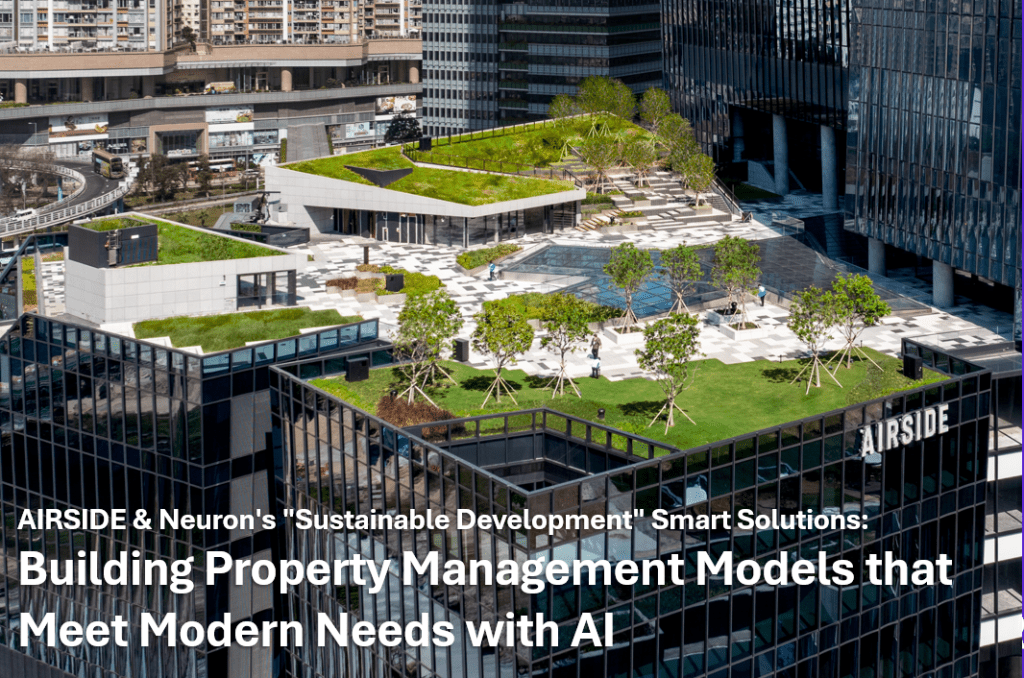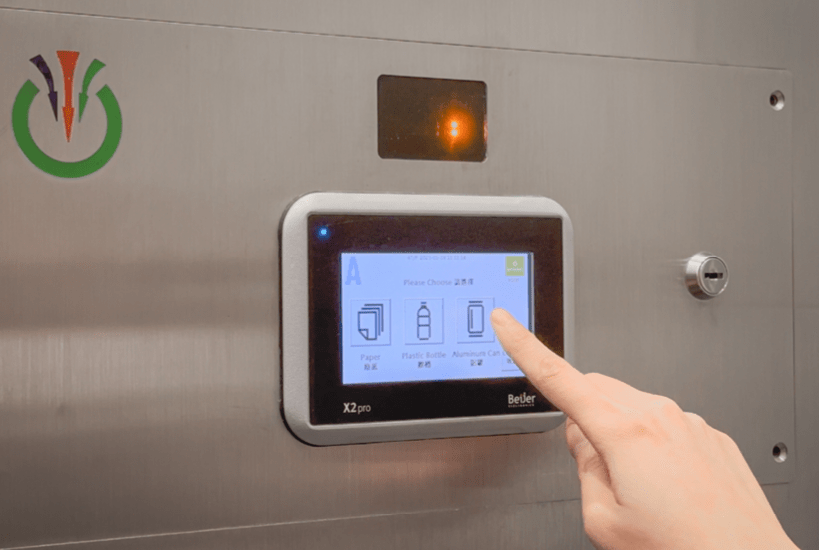
Photo courtesy of AIRSIDE.
Original article from HKET.
As we enter an era where generative AI applications are flourishing, various industries are utilizing AI to innovate products and services, enhance work efficiency, and improve operational processes. In particular, the property management sector, which emphasizes accuracy and efficiency, has seen many companies adopting AI and cloud technology for tasks such as design, data analysis, monitoring, and management. In this instance of generative AI, we invite Neuron, a company specializing in “smart building management” solutions, to share how the industry is using AI and cloud technology to help clients build and manage buildings that are more human-centered and aligned with modern societal needs.
Founded in 2018, Neuron has participated in numerous large-scale construction projects, from the iconic Water Cube in Beijing to the business hubs of Taikoo Place, and more recently, the AIRSIDE commercial landmark in Kai Tak. Neuron’s mission is to provide clients with “smart building management” solutions, specifically through their building energy management systems that integrate popular AI and cloud technology for seamless monitoring and compatible design of various hardware systems. Their platform also consolidates advanced building analytics software and energy management systems, assisting clients in operating and managing buildings efficiently and sustainably in today’s business environment that emphasizes Environmental, Social, and Governance (ESG) principles.
AIRSIDE: Promoting Sustainability

Photo courtesy of AIRSIDE.
One example of this collaboration is AIRSIDE, which opened in 2023 and is located above the Kai Tak railway station. As a major shopping center within the Kai Tak Development project, AIRSIDE is renowned for its commitment to sustainability, being the first in Hong Kong to receive eight prestigious green building certifications, including the WELL Core Platinum Standard from the International WELL Building Institute and the LEED Platinum Certification from the U.S. Green Building Council. Since 2022, the group has established its “SEWIT” sustainability framework to create shared value in areas such as social cohesion, environmental protection, wellness, innovation, and technology.
Automated Management through AI Data Collection and Analysis

Photo courtesy of AIRSIDE.
Neuron plays a crucial role in this initiative by leveraging AWS’s AI and cloud technology to establish an intelligent building system for AIRSIDE. Internally, the group can analyze data collected from smart meters, water sensors, and air quality monitors through an AI cloud platform, providing real-time insights into carbon emissions, energy usage, and air quality within the building. This enables real-time monitoring of AIRSIDE’s energy consumption for electricity and HVAC systems, ensuring effective energy use.
Additionally, the collected data can be integrated into AIRSIDE’s digital twin, allowing AI to assess the conditions of each tenant floor, helping tenants monitor details such as airflow, temperature, and humidity to maintain good indoor air quality (IAQ). AI can also automatically identify anomalies for prompt follow-up and maintenance by management, enhancing AIRSIDE’s efficiency in energy management.
Beyond internal operations, the group actively encourages tenants to collaborate on sustainability efforts through their Net Positive Lease program, which offers management fee discounts, promotional opportunities, and priority access to eco-friendly facilities. To further assist tenants in achieving their sustainability goals, they can utilize the Automatic Refuse Collection System (ARCS) for comprehensive automated sorting and weighing of waste, with AI collecting and analyzing waste data. Tenants can also access real-time data through the Neuron system to effectively manage information related to ESG and climate change, converting waste data into carbon emissions data and formulating measures targeting Scope 1, 2, and 3 to achieve ESG and emissions reduction goals.
Moreover, through AI and cloud services, the group can integrate extensive data resources on the AWS platform, enriching AIRSIDE’s digital twin and directly calculating AIRSIDE’s ESG metrics. They can also compare performance across different buildings and tenants, aiding in the formulation of policies that align with sustainable development.
Driving Smart Management Solutions with AWS Cloud Services

Neuron’s acting CEO, Peng Peiran, stated, “AWS plays an important role in our future business, allowing our clients to quickly and locally deploy their Amazon cloud, making it easier for them to comply with various local data management requirements.”
In summary, Neuron’s choice of AWS cloud services to build its AI solutions is a key factor. Neuron is also preparing to expand its operations in Southeast Asia and promote its services internationally. As Neuron’s acting CEO, Peng Peiran, stated, “AWS plays an important role in our future business, allowing our clients to quickly and locally deploy their Amazon cloud, making it easier for them to comply with various local data management requirements.” Neuron is leveraging AWS’s flexibility and scalability to enable clients to rapidly deploy and expand different AI applications, reducing the need for manual maintenance of computing facilities and infrastructure. In the long run, AWS’s global advantages will also facilitate clients’ expansion into other countries and regions.
Additionally, AWS’s AI and cloud technology services are renowned for their quality cloud infrastructure, providing clients with high storage capacity and efficient cloud services, minimizing the extra resources needed for users to maintain computing facilities and infrastructure. By choosing to integrate AWS cloud services, Neuron offers clients a stable and high-capacity data storage and usage environment, enhancing their management efficiency and sustainability.

In conclusion, as AI and cloud technology rapidly evolve, Neuron is utilizing relevant technologies and suitable cloud service providers to enable clients to implement more efficient and flexible operational models at lower costs, and even build more human-centered and modern operational models that meet specific client requirements, such as AIRSIDE’s sustainability standards.